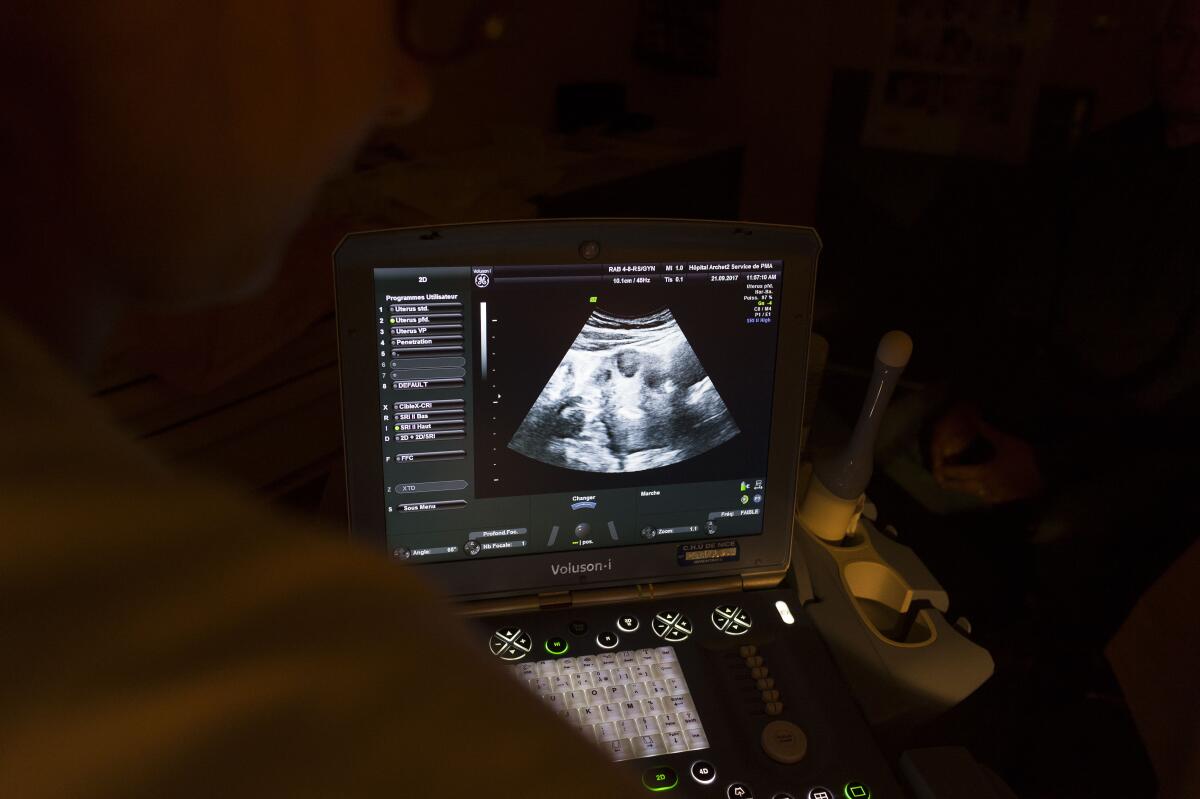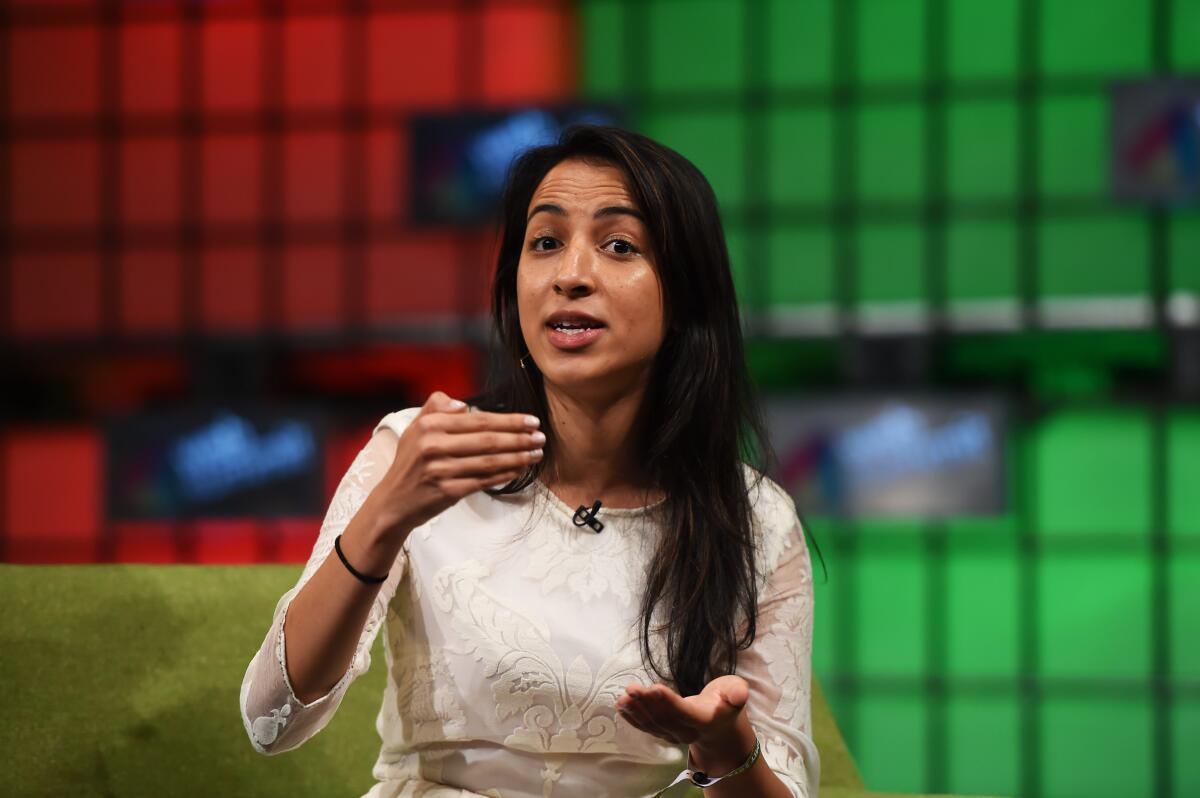A startup says it helps parents pick healthier embryos. Experts say it’s not that simple

- Share via
The decision of whether to have a child can be hard even under the best of circumstances. For those with a family history of debilitating disease, it’s often gut-wrenching. If only there were some way to answer the all-important question: Will my child be healthy?
To those potential parents, a San Francisco startup is offering a solution: a genetic test of their embryos so they can select the one with the lowest risk of disease.
For the record:
12:24 p.m. June 10, 2021This article misstated Gabriel Lázaro-Muñoz’s employer. He is an assistant professor at the Center for Medical Ethics and Health Policy at Baylor College of Medicine, not Baylor University.
“We help couples have healthy babies,” Orchid Inc. says of its tests for schizophrenia, Alzheimer’s, cancer and seven other diseases. As much as health information, the 2-year-old company sells peace of mind. “I was apprehensive about having kids due to my family history, but after going through our report I feel in control,” reads one testimonial on Orchid’s website.
Scientists say it isn’t that simple.
Peter Kraft, a Harvard professor of epidemiology, helped to develop the so-called polygenic risk scores that Orchid says are the backbone of its tests. He said the way Orchid uses them concerns him, raising the possibility that, for instance, parents could select an embryo said to be at a reduced risk of one disease without understanding it was at a higher risk for something else.
“Part of my worry is how upfront the company is when they’re counseling parents of the likely benefit of these procedures,” Kraft said. “There are some trade-offs that we just don’t understand.”
Experts have also raised ethical questions about the tests that Orchid and another company called Genomic Prediction are offering to assess and select embryos.
Gabriel Lázaro-Muñoz, assistant professor at Baylor University’s Center for Medical Ethics and Health Policy, said he was especially concerned about the companies’ claims to reduce the risk of schizophrenia given the nation’s history of discrimination against those with psychiatric disorders.
“Even though these companies are trying to market this technology within a medical context,” he said, “we have to be really careful about potential misuses.”

Orchid’s 26-year-old founder, Noor Siddiqui, says she believes many of the concerns about her company’s technology are a legacy of a healthcare system in which information is the province of doctors, not patients.
“A lot of these folks who are saying that parents shouldn’t get access to this information I think are frankly being a little bit paternalistic,” Siddiqui said last month in an interview on the biotech podcast Mendelspod. “It’s not right for healthcare workers to be gatekeepers, saying that parents don’t have the right to protect their child.”
Orchid is just the latest Silicon Valley startup to promote lab tests directly to consumers, urging them to personally take charge of their health in ways that fall outside the healthcare system. Aiding them is lax regulation of lab tests in the U.S., and in Orchid’s case, a similar lack of regulation of fertility treatments.
According to her bio, Siddiqui was a Thiel Fellow, under a program created by billionaire Peter Thiel that gives $100,000 to young people who opt to explore inventions and entrepreneurship rather than sitting in a classroom. She founded a startup called Remedy, which aimed to use Google’s augmented reality glasses to help healthcare providers care for patients. It didn’t succeed.
She soon decided to return to school, graduating from Stanford with a master’s degree in computer science. She taught a three-month course at Stanford in 2019 called “The Frontiers of Reproductive Technology.”
Siddiqui didn’t respond to numerous requests to answer questions but has spoken recently in forums that are friendly to tech entrepreneurs.
Siddiqui said the Orchid process begins with a simple at-home saliva test of both parents. If those genetic tests show the parents to be potential carriers of any of 10 diseases, they can then opt for in vitro fertilization at a fertility clinic offering Orchid’s embryo tests.
In what Siddiqui calls “embryo prioritization,” the clinic’s doctors would then use Orchid’s tests to rank the couple’s embryos for their risk of disease.
The embryo tests will be available later this year. Would-be customers can add their names to a wait list.
“I’m excited to give couples the ability to make their own luck — to bend the trajectory of their child’s future toward health — no matter what cards they were dealt,” Siddiqui tweeted last month in announcing the availability of the tests.
Siddiqui said Orchid had raised $4.6 million in seed funding from investors who include Anne Wojcicki, the founder of 23andMe, the direct-to-consumer genetic testing company, as well as Brian Armstrong and Fred Ehrsam, the founders of Coinbase, the app that lets people buy and sell cryptocurrencies.
Dystopian distraction
Before Orchid, there was Genomic Prediction, a New Jersey company founded in 2017 by Stephen Hsu, a graduate of Caltech and UC Berkeley, and two other scientists.
“Already in early 2020 the first baby (a lovely girl) was born from an embryo screened in this way,” Hsu, now a professor at Michigan State, told The Times in an email. He said the company’s tests are now available in 200 IVF clinics around the world.
Like Orchid, Genomic Prediction offers to test embryos for the risk of major maladies including diabetes and heart disease. The company’s original test also screened for intellectual disability — which quickly made headlines.
“A new genetic test straight out of a dystopian sci-fi film aims to let hopeful parents pick smarter, taller, and healthier babies,” declared a November 2019 story in the New York Post.
“The world’s first Gattaca baby tests are finally here,” said a headline in the MIT Technology Review that same month, referencing the 1997 movie in which parents select their embryos based on desired traits, including intelligence.
Laurent Tellier, the chief executive and co-founder of Genomic Prediction, told The Times the company’s test of embryos for cognitive disability became so controversial that it is no longer offered.
“We decided that media focus on this specific trait distracted from the other health benefits of polygenic testing,” Tellier said.

The tests from Orchid and Genomic Prediction go far beyond those that fertility clinics have been offering for years to look for conditions caused by single genes, such as cystic fibrosis or Huntington’s disease.
The new tests are for more common and complex diseases that scientists have linked to variations in hundreds or thousands of genes. In recent years, scientists have been able to identify the genetic variants associated with these diseases by comparing the genomes of individuals who suffer from the maladies with those who don’t. That work has generated the polygenic risk scores.
Scientists and doctors are just beginning to try to use these risk scores to assess adults’ risk of inherited diseases. They say they still have much to learn about how a person’s genes influence their risk of disease. Factors such as diet, sleep, stress and smoking can also affect that risk.
But that hasn’t stopped Orchid and Genomic Prediction, which also calls itself LifeView, from moving ahead with applying polygenic risk scores to embryos.
Curative’s mouth swabs should be administered only under strict protocols, federal regulators caution. Fred Turner, Curative’s 25-year-old founder, thinks otherwise.
Kraft, the Harvard geneticist, pointed out that many of the genetic variants are tied to multiple diseases or human traits. That means if a couple selects an embryo with a certain variant to reduce the risk of one disease, they could be increasing the risk of another condition in ways that scientists don’t yet understand, he said.
“If you pick an embryo that’s at low risk for breast cancer, you may actually be increasing your risk for other traits,” he said. “We just don’t know.”
At the same time, he said, the risk of some of these diseases is low even for those with the highest risk scores. For example, the risk of schizophrenia is just 1% on average — which might be reduced to 0.6% with embryo selection, Kraft said.
Another problem: The tests are based on databases of genetic information that comes mostly from white people of European ancestry. Scientists say they are less accurate for Black, Latino and other nonwhite people.
Testing’s allure
The promise of futuristic medical testing has given rise to some of Silicon Valley’s most notorious scandals. Elizabeth Holmes vowed her blood-testing startup Theranos would push aside lab giants Quest and Labcorp when she founded it in 2013 at age 19. Theranos reached a valuation of $9 billion before an investigation by the Wall Street Journal showed how Holmes had hidden her technology’s flaws. The company dissolved in 2018; Holmes and its former president are facing charges of fraud.
Ubiome, another San Francisco lab startup, also collapsed amid allegations of criminal wrongdoing. Founded in 2012, Ubiome sold tests of the microbiome — including the bacterial makeup of the gut — to consumers with intestinal disorders. In March, federal officials charged its founders with filing fraudulent claims for reimbursement for lab tests that weren’t validated or medically necessary.
The scandals haven’t cooled venture capitalists’ enthusiasm for backing entrepreneurs with ideas for disrupting the healthcare system and selling products to consumers anxious about their health.
Investors see fertility treatments as especially lucrative as more Americans try to start families later in life. The U.S. market for fertility treatments is now more than $7 billion, according to a presentation by Progeny, a company offering insurance for such treatments. The number of artificial fertility cycles assisted by the labs is growing by about 10% a year.
Asked about the accuracy of his company’s tests, Tellier at Genomic Prediction pointed to five studies that he and other scientists have published.
In a study in Nature Scientific Reports, Hsu and two other researchers wrote that Genomic Prediction was able to identify which of a pair of siblings would develop breast cancer, diabetes or other conditions between 70% and 90% of the time.
Tellier pointed out that Orchid has not yet published any studies.
On its website, Orchid calls its test “the most advanced genetic risk assessment available.” Yet it also has a disclaimer in its terms of service requiring users to “waive any and all claims against Orchid for any amendment or modification” to its test report.
“Your results are based on currently available information in the medical literature and scientific databases … that may be subject to change,” the disclaimer reads. “This may result in a change in your risk assessment.”
To use the companies’ embryo tests, couples must choose to undergo IVF, an expensive and painful process aimed at helping those who have trouble conceiving. In the Mendelspod interview, Siddiqui suggested that even fertile couples might want to consider using IVF in order to “mitigate disease risk with our embryo report.”
An IVF procedure that might result in the creation of five embryos involves weeks of hormone shots and then medical procedures to collect eggs and later to implant the embryos. That cycle can cost $15,000 before adding the costs of the genetic tests.
Orchid has not revealed its pricing.
Kraft questioned whether the high cost and possible complications of the IVF procedures were worth the relatively small reductions in disease risk that patients could expect with embryo selection. “There are better ways to ensure children grow up healthy,” he said.
To reassure potential customers who might have concerns about the ethics of genetic screening, Orchid features on its website an interview with bioethicist Jonathan Anomaly, associate director of the University of Pennsylvania’s philosophy, politics and economics program. Anomaly published a book last year, “Creating Future People: The Ethics of Genetic Enhancement.” He also wrote a 2018 paper entitled “Defending Eugenics.”
“It’s almost certainly wrong if you understand Darwinian evolution to think where we are now is perfect, you know?” he said in the interview on Orchid’s website. “If we can substantially reduce health risks for the next generation through reproductive technologies, is that truly a radical, immoral thing to do?”
Anomaly told The Times that he regretted the title of the 2018 paper and that he no longer uses the word eugenics because of the controversy it tends to cause. Instead, he now refers to technologies such as embryo selection as “genetic enhancement.”
Anomaly, who grew up in the South Bay and studied at UC Berkeley, said he supports the embryo tests when they can prevent debilitating diseases, but is less certain about using them to try to reduce the risk of schizophrenia, autism or some other mental disorders.
“I think we need more information,” Anomaly said.
Lázaro-Muñoz, the Baylor professor, said he worries that a company could soon go even further and begin marketing tests to parents allowing them to select embryos that appear to have the highest cognitive ability.
“In the U.S. there’s really nothing from a regulatory standpoint to stop a company from developing a test like that,” he said.
Siddiqui also sees the technology expanding.
“I think rightfully more controversial are things around enhancement or selection of things like eye color,” she said on Mendelspod. “I think that people are much, much less empathetic for that.”
“Fortunately we’re living in a free market,” she added. “So, you know, no one’s forcing you to buy our product, but we think that they’ll provide a lot of people benefits. That’s what we’re here to do.”
More to Read
Inside the business of entertainment
The Wide Shot brings you news, analysis and insights on everything from streaming wars to production — and what it all means for the future.
You may occasionally receive promotional content from the Los Angeles Times.












